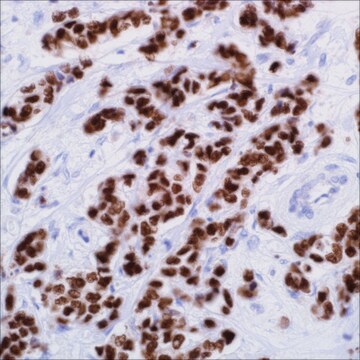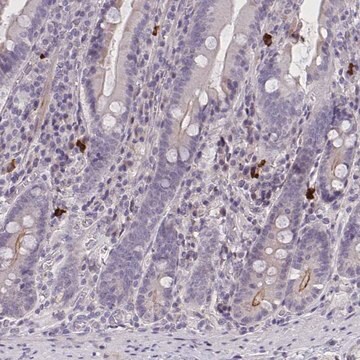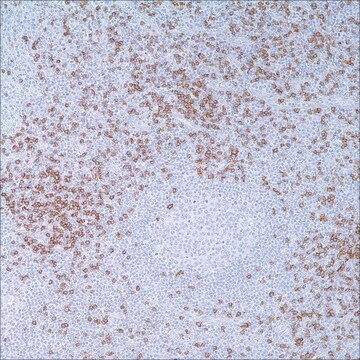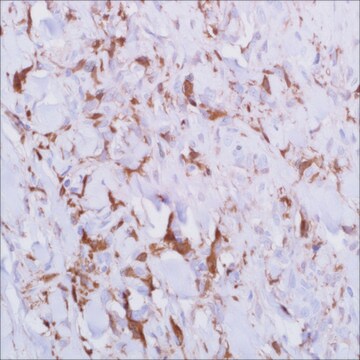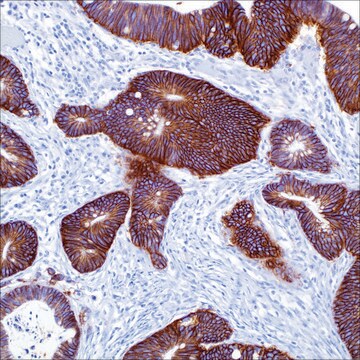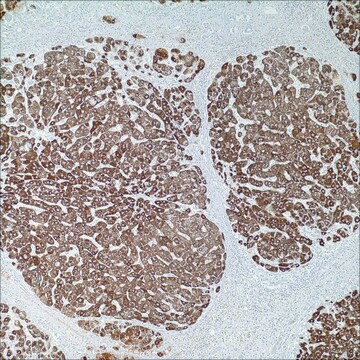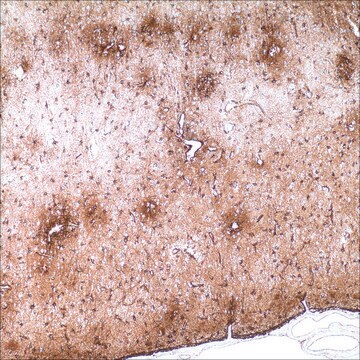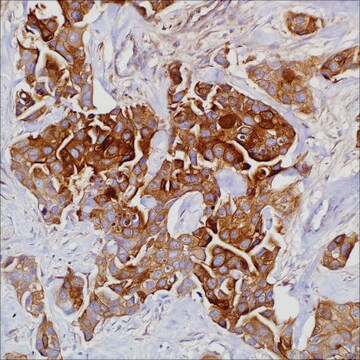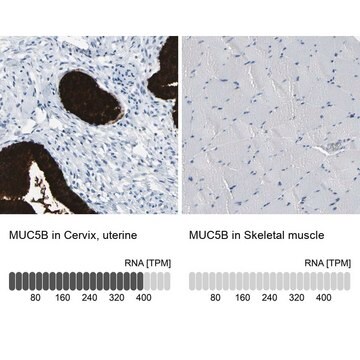推薦產品
生物源
rabbit
品質等級
100
500
共軛
unconjugated
抗體表格
culture supernatant
抗體產品種類
primary antibodies
無性繁殖
EP1582Y, monoclonal
描述
For In Vitro Diagnostic Use in Select Regions (See Chart)
形狀
buffered aqueous solution
物種活性
human
包裝
vial of 0.1 mL concentrate (257R-14)
vial of 0.5 mL concentrate (257R-15)
bottle of 1.0 mL predilute (257R-17)
vial of 1.0 mL concentrate (257R-16)
bottle of 7.0 mL predilute (257R-18)
製造商/商標名
Cell Marque™
技術
immunohistochemistry (formalin-fixed, paraffin-embedded sections): 1:100-1:500
同型
IgG
控制
breast, breast carcinoma
運輸包裝
wet ice
儲存溫度
2-8°C
視覺化
cytoplasmic
基因資訊
human ... PIP(5304)
一般說明
Gross cystic disease fluid protein-15 (GCDFP-15) is one of four major component proteins found in the cystic fluid obtained from patients with fibrocystic changes of the breast. GCDFP-15 is a marker of apocrine glandular differentiation in both benign and malignant mammary epithelium. This protein has a widespread distribution in apocrine glands elsewhere in the axillary and perianal tissues, as well as in the sublingual and submaxillary salivary glands. The GCDFP-15 protein is a 15 kDa glycoprotein shown to be prolactin-inducible, and the GCDFP-15 gene has been cloned. Ultrastructurally, the GCDFP-15 protein has been localized in Golgi vesicle and cytoplasmic granules. The protein is released by exocytosis at the apices of the mammary epithelial cells. The primary application for this antibody product is the identification of breast carcinoma in the metastatic setting, or fluid analysis. In a study by Wick et al. on paraffin sections of 105 breast cancers and 585 non-mammary malignancies in order to assess its value in this context, anti-GCDFP-15 was compared with another putative mammary epithelial marker, alpha-lactalbumin (ALA), with respect to sensitivity and specificity for a diagnosis of breast carcinoma. Overall, the rates of specificity and sensitivity and positive predictive value for GCDFP-15 were 95%, 74%, and 74%, respectively. A consistent congruency between the reactivity patterns of primary and metastatic breast cancers was noted for GCDFP-15. Besides mammary carcinomas, the major tumor types that express GCDFP-15 were carcinomas of the salivary glands and sweat glands. Since the latter two types of lesions are unlikely to be diagnosed as metastatic breast cancer, statistical indices were recalculated after exclusion of these three tumor types. Following this exclusion, the adjusted rate of specificity of GCDFP-15 and positive predictive value for a diagnosis of metastatic carcinoma of the breast were each 99%. Another study by Bhargava et al. has shown GCDFP-15 staining of a higher percentage of cancer cells in lobular carcinoma as compared to ductal carcinoma of the breast.
聯結
GCDFP-15 Positive Control Slides, Product No. 257S, are available for immunohistochemistry (formalin-fixed, paraffin-embedded sections).
外觀
Solution in Tris Buffer, pH 7.3-7.7, with 1% BSA and <0.1% Sodium Azide
準備報告
Download the IFU specific to your product lot and formatNote: This requires a keycode which can be found on your packaging or product label.
其他說明
For Technical Service please contact: 800-665-7284 or email: service@cellmarque.com
法律資訊
Cell Marque is a trademark of Merck KGaA, Darmstadt, Germany
未找到適合的產品?
試用我們的產品選擇工具.
儲存類別代碼
12 - Non Combustible Liquids
水污染物質分類(WGK)
WGK 2
閃點(°F)
Not applicable
閃點(°C)
Not applicable
分析證明 (COA)
輸入產品批次/批號來搜索 分析證明 (COA)。在產品’s標籤上找到批次和批號,寫有 ‘Lot’或‘Batch’.。
S Ansai et al.
The American Journal of dermatopathology, 17(3), 249-255 (1995-06-01)
We investigated immunohistochemically the localization of lysozyme and Leu M1 in normal skin, 76 cases of benign sweat gland tumors, 28 cases of malignant sweat gland tumors, 23 cases of extramammary Paget's disease, 7 cases of sebaceous carcinoma, 6 cases
G Mazoujian et al.
The American journal of pathology, 110(2), 105-112 (1983-02-01)
Gross cystic disease fluid is a pathologic secretion from breast composed of several glycoproteins, including a unique 15,000-dalton monomer protein, GCDFP-15. By the immunoperoxidase technique, GCDFP-15 was localized in the apocrine metaplastic epithelium lining breast cysts and in apocrine glands
U Raju et al.
Modern pathology : an official journal of the United States and Canadian Academy of Pathology, Inc, 6(5), 516-520 (1993-09-01)
Signet ring carcinoma of the breast often metastasizes to gastrointestinal tract and female genital tract. We report clinicopathologic features of 10 breast carcinomas with signet ring features, five of which had unusual metastatic patterns. The primary breast tumor in all
G Mazoujian et al.
The American Journal of dermatopathology, 10(1), 28-35 (1988-02-01)
Sixty-five cases of benign sweat gland tumors of the skin were studied for the expression and localization of gross cystic disease fluid protein-15 (GCDFP-15) by immunoperoxidase methods. There was positive staining of tumors of probable apocrine differentiation in 10 of
M R Wick et al.
Human pathology, 20(3), 281-287 (1989-03-01)
The identification of metastatic carcinoma of the breast may be difficult in the absence of a previous history of breast cancer. Various immunophenotypic markers have been introduced to aid in this process. A monoclonal antibody directed at a 15-kilodalton (kd)
我們的科學家團隊在所有研究領域都有豐富的經驗,包括生命科學、材料科學、化學合成、色譜、分析等.
聯絡技術服務